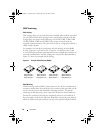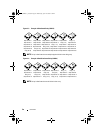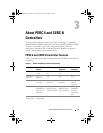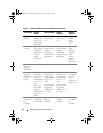
About PERC 6 and CERC 6i Controllers 25
A SMART failure is also referred to as a predicted failure. There are numerous
factors that relate to predicted physical disk failures, such as a bearing failure,
a broken read/write head, and changes in spin-up rate. In addition, there are
factors related to read/write surface failure, such as seek error rate
and excessive bad sectors. For information on physical disk status, see "Disk
Roaming" on page 27.
NOTE: For detailed information on Small Computer System Interface (SCSI)
interface specifications, see www.t10.org and for detailed information on for Serial
Attached ATA (SATA) interface specifications, see www.t13.org.
Initializing Virtual Disks
You can initialize the virtual disks in four ways as described in the following
sections.
Background Initialization
Background Initialization (BGI) is an automated process that writes the
parity or mirror data on newly created virtual disks. BGI assumes that the data
is correct on all new drives. BGI does not run on RAID 0 virtual disks.
NOTE: You cannot permanently disable BGI. If you cancel BGI, it automatically
restarts within five minutes. For information on stopping BGI, see "Stopping
Background Initialization" on page 107.
The BGI rate is controlled by the Open Manage storage management
software. After you have changed the BGI rate in Open Manage storage
management software, the change does not take effect until the next BGI
is run.
NOTE: Unlike full or fast initialization of virtual disks, background initialization does
not clear data from the physical disks.
Consistency Check (CC) and BGI perform similar functions in that they
both correct parity errors. However, Consistency Check reports data
inconsistencies through an event notification, but BGI does not (BGI
assumes the data is correct, as it is run only on a newly created disk). You can
start Consistency Check manually, but not Background Initialization.
Dell_PERC6.1_UG.book Page 25 Wednesday, April 15, 2009 4:18 PM


















